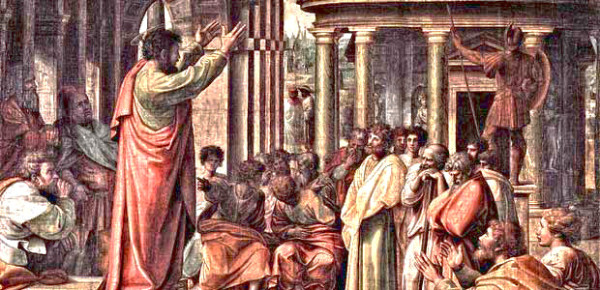Catholic Saint: “We Confess that We are Atheists”
by Stephen Bullivant
Filed under Religion
Picture the scene: it’s festival day in a provincial Roman city c. AD 156, and people have come from all around to see some local Christians being put to death. A young believer called Germanicus stands in the arena, not merely facing the savage beasts, but actively urging them on. Irritated by the youth’s composure, the crowd who have gathered to see him torn apart cry out: ‘Down with the atheists!’ Later, the old bishop Polycarp (whom ancient tradition assures us was a disciple of St John) is brought into the arena. He is ordered—on pain of death—to denounce his fellow Christians in the same way. Whereupon, we are told:
"Polycarp’s brow darkened as he threw a look round the turbulent crowd of heathens in the circus; and then, indicating them with a sweep of his hand, he said with a growl and a glance to heaven 'Down with the atheists!'" (Martyrdom of Polycarp, 9).
'Atheist' here is a translation of the Greek word atheos (pl. atheoi), which could be used as either a noun or an adjective (as in Ephesians 2.12, its only appearance in the New Testament, where it is often translated 'without God'). While atheos could carry a range of meanings and connotations, its usage here is reasonably transparent. In effect, we have the Christian Polycarp and the pagan crowd mutually denouncing each other as ‘infidels’. As far as the crowd is concerned, the Christians deny and dishonor the real Roman gods, while affirming their own false one. (At one point, the crowd cries out that Polycarp is a "destroyer of our gods, who is teaching whole multitudes to abstain from sacrificing to them or worshiping them"—Martyrdom, 12.) And as far as Polycarp is concerned, the crowd does precisely the opposite.
Throughout western history, from Socrates onward, the term 'atheist' has been bandied about quite liberally. Almost always, until comparatively recently, it was mostly an insult directed at other people. However, in the writings of St. Justin Martyr—one of Polycarp’s contemporaries, and himself a convert from paganism - this basic idea receives a somewhat different twist. Justin wrote a number of apologias (‘defenses’ rather than ‘apologies’; hence 'apologetics') to explain what and why Christians believed for his pagan contemporaries, and to correct common misunderstandings about them. The charge of ‘atheism’ was one of these.
Justin, however, novelly chooses to side with both Polycarp and the crowd, declaring in his First Apology: "We confess that we are atheists, so far as gods of this sort [i.e., the Greco-Roman ones] are concerned, but not with respect to the Most True God" (First Apology, 6). For Justin then, there is at least one, albeit qualified, sense in which Christians are, and must be, atheists.
A very similar idea, although expressed slightly differently, appears in the New Testament in 1 Corinthians. In the course of giving practical advice on the eating of food sacrificed to idols, Paul also distinguishes between the "so-called gods in heaven or on earth" and the "one God" (1 Cor 8:5-6). Paul seems to oscillate between implying that these so-called gods are simple fictions ("no idol in the world really exists"), and affirming that though real enough in themselves, these "many gods and many lords" certainly do not deserve to share the divine name. But regardless of whether they are demons or mere figments, Paul’s basic point is clear: "for us there is one God, the Father, from whom are all things and for whom we exist, and one Lord, Jesus Christ, through whom all things are and through whom we exist" (1 Cor 8:4-6).
For Paul, as for Justin, Christians must therefore be atheists regarding "the gods". And nor is this a merely academic point for him. Rather, he is anxious that the Corinthians be vigilant against lapsing, or inadvertently causing others to lapse, into idolatry. Recent converts, in particular, might be fooled into thinking that "the so-called gods" are actually deserving of the name: "Since some have become so accustomed to idols until now, they still think of the food they eat as offered to an idol; and their conscience, being weak, is defiled" (1 Cor 8:7). (Hearteningly perhaps, this suggests that crises of catechesis are not a new phenomenon within the Church.) Hence, lest the practice of eating food sacrificed to idols, though in itself innocuous enough, become "a stumbling-block to the weak", Paul advises against it. Better to go without cheap meat than to confuse others about the distinction between the false "gods", and the Most (and Only) True one.
This point may be developed (much) further still. In fact, it is perfectly possible to turn Justin and Paul's arguments on their head. What if it is not the Greco-Roman gods who are misnamed, but the Most True 'God'? After all, let us not forget that the name God is itself a borrowed word: Hellenized Jews stole as a name for Yahweh the already-existing Greek descriptive noun theos. But, as Paul and Justin so rightly insist, the Judeo-Christian God is not literally ‘a god’ in the original Greco-Roman sense of the word (‘We confess that we are atheists regarding gods of this sort’). Hence, as Herbert McCabe, OP once put it:
"‘God’, ‘Theos’, ‘Deus’ is of course a name borrowed from paganism; we take it out of its proper context, where it is used for talking about the gods, and use it for our own purposes. This is quite a legitimate piece of borrowing and quite safe as long as it does not mislead us into thinking that the God we worship (or don’t) is a god. […] He is always dressed verbally in second-hand clothes that don’t fit him very well. We always have to be on our guard against taking these clothes as revealing who or what he is." (God Still Matters, Continuum 2002, p. 55)
If so, then there is an even deeper sense in which Christians are, and must be, atheoi.
There is a very great deal more that could, and should, be said on this topic—the problematic nature of all religious language—and in future Strange Notions posts I certainly hope to. (The basic problem is this: if I can't adequately put into words what I think and feel about my wife and daughter—and when I try, the best I can normally hope to do is resort to fairly weak metaphors and analogies—how can we possibly hope accurately to talk about the Creator of life, the universe, and everything [including me, my thoughts and feelings, and wife and daughter]?)
Now though—and almost completely gratuitously—I'd like instead to return to our original topic: the early Christians being denounced as 'atheists' by the Romans. While there's no shortage of examples, this one is my absolute favourite. It comes from the fourth-century Emperor Julian, who renounced his Christian upbringing in order to restore the old Roman gods. In a 362 letter to the pagan high-priest of Galatia, he complains about the (then) new evangelization:
"Why do we not observe that it is their benevolence to strangers, their care for the graves of the dead, and the pretended holiness of their lives that have done most to increase atheism [i.e., Christianity]?... For it is disgraceful that... the impious Galileans support not only their own poor, but ours as well." (Quoted in Novak, Christianity and the Roman Empire, Trinity 2001, p. 183)
Related Posts
Note: Our goal is to cultivate serious and respectful dialogue. While it's OK to disagree—even encouraged!—any snarky, offensive, or off-topic comments will be deleted. Before commenting please read the Commenting Rules and Tips. If you're having trouble commenting, read the Commenting Instructions.













